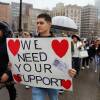As momentum builds at the State House to let undocumented immigrants obtain drivers' licenses in Massachusetts, several big-city mayors are urging lawmakers to finally make the proposal a reality.
Boston Mayor Michelle Wu, Salem Mayor Kim Driscoll, Lynn Mayor Jared Nicholson and Brockton Mayor Robert Sullivan all voiced support for the Work and Family Mobility Act during an online briefing by proponents Tuesday.
Driscoll, who is seeking the Democratic nomination for lieutenant governor, noted that the idea has been brewing for years.
"I support this legislation, and supported the earlier iterations going back, I think, nearly five years ago," Driscoll said.
In addition to letting undocumented immigrants drive to work and school, Driscoll said, expanding eligibility for state drivers' licenses would be a catalyst for economic mobility.
"In Massachusetts, having access to a vehicle enables you to get to not only employment opportunities, but to maybe start your own business," she said. "It just really highlights the opportunity within a family to better provide for themselves."
Wu, the first mayor to speak, invoked the experiences of her parents, who immigrated to the United States from Taiwan.
"I know what it feels like to see the systems that are there, built with programming and services and funding, feel so far away, because of the many barriers that stand in the way," she said.
Tom Ambrosino, the city manager of Chelsea, said that, if implemented, the proposal would make driving there safer, noting that 45 percent of Chelsea residents were born outside the U.S. and that many of them lack legal status.
"I have no doubt it will improve public safety in our community," he said. "Having more of our residents trained and legitimately licensed and insured on the road will absolutely make a difference in safety. And I think that's why [Chelsea Police Chief Brian Kyes] and the major police chiefs and other public-safety organizations support this effort."
Ambrosino also said that, despite the connotations of the term "undocumented," many individuals without legal status already possess an abundance of paperwork that establish their identity.
"Even though they ... don't have legal immigration status, they all have a slew of documentation that identifies them, whether that's passports, diplomatic papers, or identifications from their nation of origin," he said. “This will not be difficult to implement.”
In February, the Massachusetts House passed a bill that would let undocumented individuals obtain standard state drivers' licenses if they can prove their identity, date of birth and Massachusetts residency and meet other requirements for licensure. That bill requires that state officials take steps to ensure the recipients of these licenses not be automatically registered to vote.
The vote in the Democrat-dominated House was 120 to 36, suggesting the chamber would override a potential veto by Gov. Charlie Baker. Baker, a Republican, has voiced skepticism about the proposed reform, but hasn't explicitly vowed to veto it if it reaches his desk.
Before that happens, though, the Massachusetts Senate — which, like the House, is dominated by Democrats — needs to pass its own version of the bill.
After the House passed its version in February, Senate President Karen Spilka (D-Ashland) said she was "excited to see progress is being made on this measure, because individuals and families deserve to feel safe, and drivers' licenses for all qualified state residents is good for our economy and public safety."
A spokesperson for the Senate president said Tuesday that she's still having conversations about the proposal with her members, and did not offer a timeline for when it will come to the Senate floor for a vote.
The experiences of undocumented communities during the COVID-19 pandemic, which hit them especially hard, may have boosted the proposed reform's prospects on Beacon Hill. Many undocumented individuals worked in-person providing essential services throughout the pandemic, and there's some evidence that carpooling linked to the drivers' license status quo helped spread the virus.
Nicholson, the Lynn mayor, said Tuesday that when the city's school-bus system ground to a halt during the pandemic, the lack of license eligibility put undocumented kids and their parents in a bad spot.
"One of the things I thought was particularly frustrating, and just unfair, was that for certain families ... there was this inability to legally obtain a driver's license that would allow for them to lawfully get their kids to school," Nicholson said. "I think it's just another example that [it’s] time for this to be fixed."
Sullivan, the Brockton mayor, offered an especially blunt assessment.
"As an elected official, we always have to do what's right," he said. "And this is what needs to be done. Simple as that."
Sixteen states, some of which are led by Republican governors, have already passed similar legislation.








